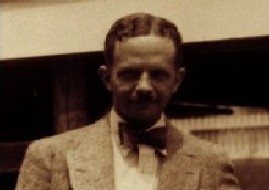Teachers' Domain - Digital Media for the Classroom and Professional Development
User: Preview

Source: The Rise and Fall of Jim Crow: "Don't Shout Too Soon"
This video from the The Rise and Fall of Jim Crow presents experiences from the life of Walter White. This unsung hero was an African American man who put his life in danger passing for a white man while working as the chief investigator of the crime of lynching for the NAACP. White was successful on countless occasions in documenting the crime and even collecting and publishing the names of perpetrators.
During the race riot of 1906 in Atlanta, Ga., Walter White, an African American, escaped the mob only because his fair complexion allowed him to pass through safely. The experience led him to become one of the outstanding civil-rights leaders in America between 1920 and 1955.
White joined the National Association for the Advancement of Colored People (NAACP) in 1918 and almost immediately became its chief investigator of lynching. His fair appearance enabled him to travel to communities where lynchings had occurred and gather details about the crimes, including the names of the participants. He would then publish this information in the NAACP magazine The Crisis and various newspapers.
In 1929, White became executive director of the NAACP, succeeding James Weldon Johnson. White's main goal was to have the federal government pass an anti-lynching law. Although Southern senators prevented the law from being enacted, White's exposure of the "Southern horror" helped change the climate of public opinion and put pressure on the South. The number of lynchings declined in the latter part of the 1930s.
In 1934, a long simmering feud between White and W.E.B. Du Bois came to a head after Du Bois wrote an article advocating voluntary segregation as a temporary expedient in the face of massive white resistance to blacks. This was contrary to the NAACP's policy, and Du Bois resigned rather than retract his position.
White invited Charles Hamilton Houston, Dean of Law at Howard University, to join the NAACP and lead its legal attack on Jim Crow. In 1941, White assisted his colleague, labor leader A. Philip Randolph, in pressuring President Franklin Delano Roosevelt to issue the executive order creating the Fair Employment Practices Act, which banned discrimination in government and war industries. White's autobiography, A Man Called White, was published in 1948.
NARRATION: One organization stood firmly against this onslaught of evil: the NAACP, the National Association for the Advancement of Colored People, the foremost interracial civil rights organization in America. One man was becoming the unlikely hero of the NAACP's battle against racial terrorism. Twenty-seven-year-old Walter White became the chief investigator of lynchings and massacres.
WENDELL LAW: Walter White's task was to come into the South …and oh, one of the heroic stories and we don't tell it anymore. Here was a black man, who was, had blue eyes and blond hair, who risked his life going among the lynchers. Passing as a white man. And got the names of many of white men who had been a part of lynch mobs.
NARRATION: At the NAACP, they thought White was risking his life. He knew he was. He wrote to his superiors.
VOICE OF WALTER WHITE: "I understand that this is dangerous. I take full responsibility if anything happens to me, and I hold you not liable in the event of my injury or death." Walter White.
NARRATION: As the summer of 1919 drew to a close, White read a newspaper account claiming that black farmers near the town of Elaine, Arkansas had incited an armed uprising against the local white community.
VOICE OF WALTER WHITE: "I was eager to go to the scene and left for Arkansas on the first train, after we had scraped up enough money for the fare." Walter White.
NARRATION: When White arrived, he discovered that black farmers, tired of continually being cheated out of their fair share of the cotton crop, had formed a union to sue their landlords.
VOICE OF WALTER WHITE: "They were meeting in a Negro church in Hoop Spur. When a white mob fired on the church, the fire of the attackers was returned and one of the assailants was killed. The match had been applied to the powder keg. Within a few minutes, efficiently directed, heavily armed mobs swept over the countryside hunting down and killing every Negro they could find." Walter White.
NARRATION: When the killing stopped, some said as many as two hundred blacks had been killed. Hundreds were arrested, twelve sentenced to death for killing whites. But even as White was uncovering the evidence which would ultimately free all of the accused, he found himself suddenly in danger.
VOICE OF WALTER WHITE: "I was interviewing some whites when a black man told me that my identity had been discovered and a lynching party was prepared for me. I boarded the first train out of Helena. The conductor said, "You're leaving just before the fun is about to start. There's a damned yellow nigger down here passing for white and the boys are gonna get him, and when they get through with him, he won't pass for white no more." No matter what the distance, I shall never take a train ride as long as that one. Later in Memphis I learned that news had been circulated there that I had been lynched in Arkansas that afternoon." Walter White.
 Loading Standards
Loading Standards